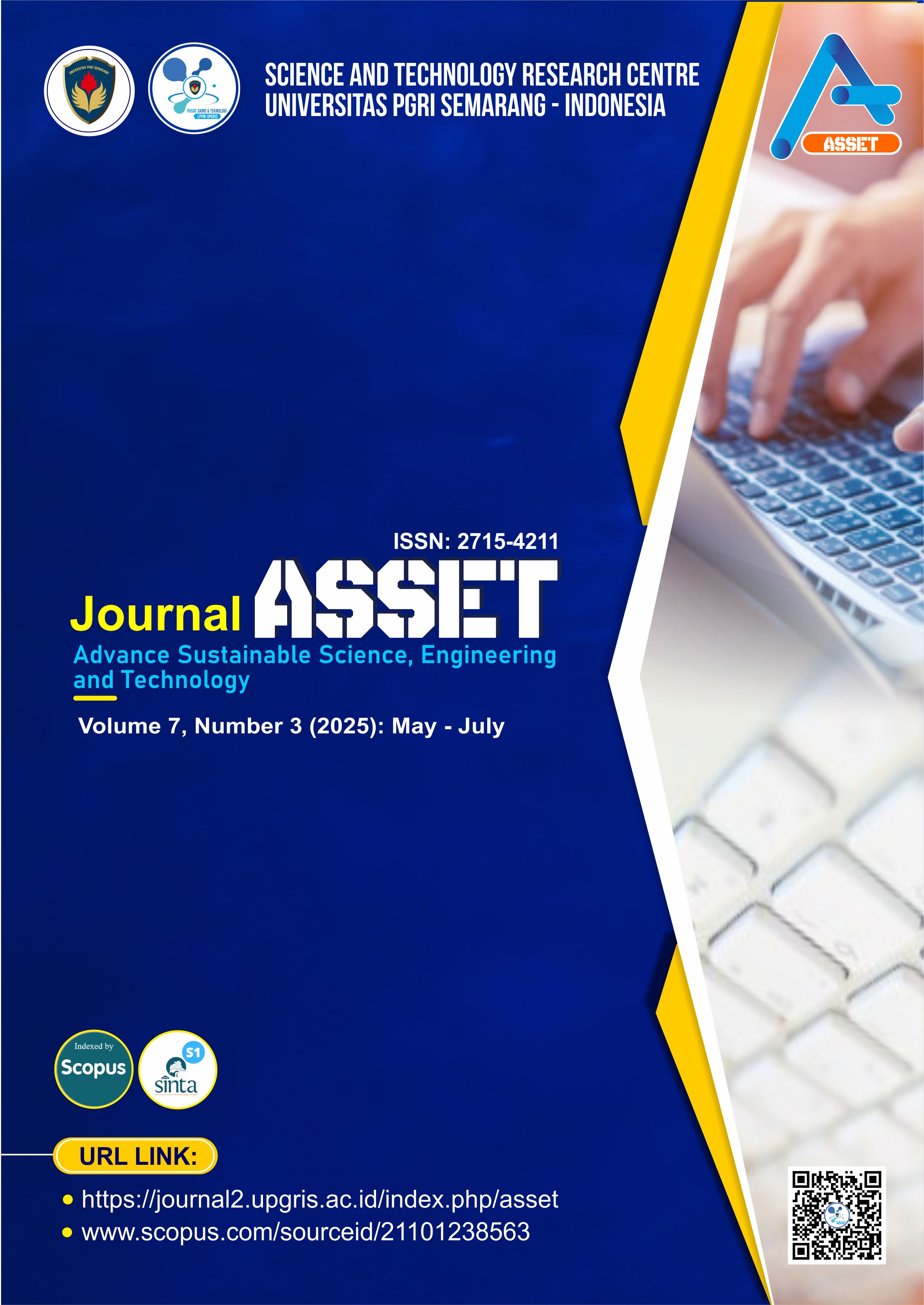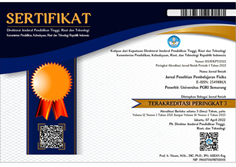Mechanical Performance of Epoxy Composite Reinforced with Wood Dust and Crumb Rubber Waste
DOI:
https://doi.org/10.26877/asset.v7i4.2041Keywords:
polymer composites, waste fillers, mechanical propertiesAbstract
The incorporation of wood dust and crumb rubber waste as filler in polymer matrix composite still requires in-depth evaluation of mechanical properties because they have different characteristics. This study evaluates the tensile, flexural, and hardness properties of epoxy composites reinforced with various fractions of wood dust and crumb rubber (5, 10, and 15%). The results showed that the composite with 5% crumb rubber produced the highest tensile strength of 15.52 MPa (CR5), while the highest flexural strength was 30.46 MPa (CR10), and the highest hardness was 75.9 HRC (CR15), indicating superior performance for CR fillers. The observations of the fracture surface showed that increasing the fraction of wood dust contributed to lowering the mechanical performance due to the relatively large distribution of voids and agglomeration. This finding confirms the importance of filler type and fraction selection on composite performance. Future research is recommended to explore filler surface modification and hybrid combinations to improve dispersion and bonding between phases in composites.
References
[1] Purohit A, Sahoo PS, Chauhan PK, et al. Mechanical and tribo-performance analysis of LD sludge filled wood apple dust-epoxy composites using response surface methodology. **Interactions**, 2024;245(1):131. doi: 10.1007/s10751-024-01978-y.
[2] Jose AS, Athijayamani A, Jani SP. A review on the mechanical properties of bio waste particulate reinforced polymer composites. **Mater Today Proc**, 2021;37(2):1757–60. doi: [https://doi.org/10.1016/j.matpr.2020.07.360](https://doi.org/10.1016/j.matpr.2020.07.360).
[3] Balaji A, Udhayasankar R, Karthikeyan B, et al. Mechanical and thermal characterization of bagasse fiber/coconut shell particle hybrid biocomposites reinforced with cardanol resin. **Results Chem**, 2020;2:1-7. doi: [https://doi.org/10.1016/j.rechem.2020.100056](https://doi.org/10.1016/j.rechem.2020.100056).
[4] Ramnath BV, Jeykrishnan J, Ramakrishnan G, et al. Sea shells and natural fibres composites: a review. In: **Materials Today: Proceedings**. Elsevier; 2018:1846-51. doi: [https://doi.org/10.1016/j.matpr.2017.11.284](https://doi.org/10.1016/j.matpr.2017.11.284).
[5] Imran AI, Abdullah NA, Rumaizi MA, et al. Opportunities and challenges in the sustainable integration of natural fibers and particles in friction materials for eco-friendly brake pads. **Mech Eng Soc Ind**, 2024;4(3):337-67. doi: 10.31603/mesi.12271.
[6] Cahyani AL, Linda V, Guntama D, et al. Effect of Chitosan Variation in Starch and Cellulose Based Biofoam. **Adv Sustain Sci Eng Technol**, 2023;5(3):1-9. doi: 10.26877/asset.v5i3.17126.
[7] Kholil A, Dwiyati ST, Wirawan R, et al. Brake Pad Characteristics of Natural Fiber Composites from Coconut Fibre and Wood Powder. **J Phys Conf Ser**, 2021:1-7. doi: 10.1088/1742-6596/2019/1/012068.
[8] de Carvalho MS, Azevedo JB, Barbosa JDV. Effect of the melt flow index of an HDPE matrix on the properties of composites with wood particles. **Polym Test**, 2020;90:106678. doi: 10.1016/j.polymertesting.2020.106678.
[9] Jian B, Li Y, Gu J, et al. A review on flexural properties of wood-plastic composites. **Polymers (Basel)**, 2022;14(19):3942. doi: 10.3390/polym14193942.
[10] Ferede E. Evaluation of Mechanical and Water Absorption Properties of Alkaline‐Treated Sawdust‐Reinforced Polypropylene Composite. **J Eng**, 2020;2020(1):3706176. doi: [https://doi.org/10.1155/2020/3706176](https://doi.org/10.1155/2020/3706176).
[11] Singsang W, Sridach W, Channasan S, et al. Effects of natural rubber compound and crumb rubber on mechanical and morphological properties of biodegradable poly (butylene succinate). In: **Journal of Physics: Conference Series**. IOP Publishing; 2022:12012. doi: 10.1088/1742-6596/2175/1/012012.
[12] Jiang W, Zhu H, Haruna SI, et al. Effect of crumb rubber powder on mechanical properties and pore structure of polyurethane-based polymer mortar for repair. **Constr Build Mater**, 2021;309:125169. doi: 10.1016/j.conbuildmat.2021.125169.
[13] Mahesh V, Mahesh V. Tribological characterization of sustainable Jute-Epoxy-Rubber crumb hybrid composite. **Proc Inst Mech Eng Part C J Mech Eng Sci**, 2022;236(19):10281-9. doi: [https://doi.org/10.1177/09544062221103941](https://doi.org/10.1177/09544062221103941).
[14] Kevin B, Sarker PK, Madhavan MK. Performance assessment and microstructural characterization of combined surface, chemical and polymer treated crumb rubber concrete. **Sci Rep**, 2025;15(1):1-20. doi: [https://doi.org/10.1038/s41598-025-97189-8](https://doi.org/10.1038/s41598-025-97189-8).
[15] Mahesh V, Mahesh V, Tejaswini JN, et al. Development of sustainable abrasive wear resistant waste rubber crumb reinforced polymer matrix composites. **Proc Inst Mech Eng Part C J Mech Eng Sci**, 2023;237(9):2141-50. doi: [https://doi.org/10.1177/09544062221136441](https://doi.org/10.1177/09544062221136441).
[16] Uzoma AE, Nwaeche CF, Al-Amin M, et al. Development of interior and exterior automotive plastics parts using kenaf fiber reinforced polymer composite. **Eng**, 2023;4(2):1698-710. doi: [https://doi.org/10.3390/eng4020096](https://doi.org/10.3390/eng4020096).
[17] ASTM D638. Standard Test Method for Tensile Properties of Plastics. In: **ASTM Standards**. 2014;8:1-16.
[18] ASTM D790. Standard Test Methods for Flexural Properties of Unreinforced and Reinforced Plastics and Electrical Insulating Materials. D790. In: **ASTM Standards**. 2002:1-12.
[19] Shahapurkar K. Compressive behavior of crump rubber reinforced epoxy composites. **Polym Compos**, 2021;42(1):329-41. doi: [https://doi.org/10.1002/pc.25828](https://doi.org/10.1002/pc.25828).
[20] Cionita T, Zega Z, Tarigan H. The Influence of Hybrid Fillers on the Mechanical Properties of Woven Ramie-Reinforced Epoxy Composites. **E3S Web Conf**, 2024;576:1-12. doi: 10.1051/e3sconf/202457606006.
[21] Halász IZ, Kocsis D, Simon DÁ, et al. Development of polypropylene-based thermoplastic elastomers with crumb rubber by dynamic vulcanization: a potential route for rubber recycling. **Period Polytech Chem Eng**, 2020;64(2):248-54. doi: [https://doi.org/10.3311/PPch.13962](https://doi.org/10.3311/PPch.13962).
[22] Mohammed AS. Evaluation of Tribological Properties of UHMW-PE Composite Coatings Reinforced with Crumb Rubber Particles. **Arab J Sci Eng**, 2024;49(2):2143-52. doi: 10.1007/s13369-023-08192-y.
[23] Nayak SK, Satapathy A. Development and characterization of polymer-based composites filled with micro-sized waste marble dust. **Polym Polym Compos**, 2021;29(5):497-508. doi: [https://doi.org/10.1177/0967391120926066](https://doi.org/10.1177/0967391120926066).
[24] Nukala SG, Kong I, Kakarla AB, et al. Development of wood polymer composites from recycled wood and plastic waste: thermal and mechanical properties. **J Compos Sci**, 2022;6(7):194. doi: [https://doi.org/10.3390/jcs6070194](https://doi.org/10.3390/jcs6070194).
[25] Kumar R, Kumar K, Sahoo P, et al. Study of mechanical properties of wood dust reinforced epoxy composite. **Procedia Mater Sci**, 2014;6:551-6. doi: [https://doi.org/10.1016/j.mspro.2014.07.070](https://doi.org/10.1016/j.mspro.2014.07.070).
[26] Lakhiar MT, Zhao X, Guo Y, et al. Investigations on the mechanical and life cycle properties of novel marine-based sustainable BFRP composites. **Constr Build Mater**, 2024;453:139105. doi: [https://doi.org/10.1016/j.conbuildmat.2024.139105](https://doi.org/10.1016/j.conbuildmat.2024.139105).
[27] Nafis ZAS, Mohamad N, Mokhtar NA, et al. Effect of wood dust fibre treatments reinforcement on the properties of recycled polypropylene composite (r-WoPPC) filament for fused deposition modelling (FDM). **Materials (Basel)**, 2023;16(2):479. doi: [https://doi.org/10.3390/ma16020479](https://doi.org/10.3390/ma16020479).
[28] Siregar JP, Dewi R, Imran AI. Tensile Properties of Wood Sawdust Fibre Reinforced Epoxy Composites. 2023;2023(25).
[29] Yu P, Li S, Xu H, et al. Investigation on the physical, mechanical and microstructural properties of epoxy polymer matrix with crumb rubber and short fibres for composite railway sleepers. **Constr Build Mater**, 2021;295:123700. doi: [https://doi.org/10.1016/j.conbuidmat.2021.123700](https://doi.org/10.1016/j.conbuidmat.2021.123700).
[30] Nuzaimah M, Sapuan SM, Nadlene R, et al. Sodium hydroxide treatment of waste rubber crumb and its effects on properties of unsaturated polyester composites. **Appl Sci**, 2020;10(11):3913. doi: [https://doi.org/10.3390/app10113913](https://doi.org/10.3390/app10113913).











